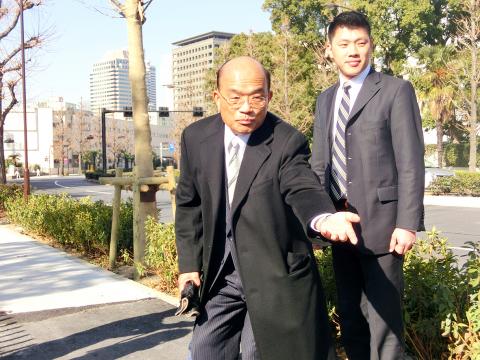Taiwan-Japan relations could be strengthened to promote regional stability because both countries share the values of democracy, freedom and human rights, Democratic Progressive Party (DPP) Chairman Su Tseng-chang (蘇貞昌) said in Tokyo yesterday.
“The DPP hopes that Taiwan and Japan can strengthen their bilateral partnership as members of a democratic alliance, which would make the Asia-Pacific a region of security, stability and prosperity by promoting dialogue and closer engagement,” Su said on the second day of his five-day visit to Japan.
Taiwan, Japan, South Korea and the US all share those same values, said the DPP chairman, who is leading a 30-member delegation on his first overseas trip since assuming the party leadership in May last year.

Photo: Lee Hsin-fang, Taipei Times
Su made the comments during his visit to the Japan-Republic Of China Diet Members’ Consultative Council, a pro-Taiwan parliamentary group in the Japanese Diet, and met its president — Japanese Senator Takeo Hiranuma.
Su reiterated Taiwanese affinity with Japan, saying that this was not only because of the close proximity of the two countries, but also because of a long history of bilateral trade and cultural exchanges.
The assistance offered by the nations to each other after the Japanese earthquake in March 2011 and the 921 Earthquake in Taiwan in 1999 was solid evidence of a strong friendship, Su said.
Earlier yesterday afternoon, Su visited the ruling Liberal Democratic Party (LDP) headquarters and met LDP Secretary-General Shigeru Ishiba, a former defense minister, to exchange views on security in East Asia, the dispute over the Diaoyutai Islands (釣魚台), known as the Senkakus in Japan, and bilateral trade relations.
Speaking to Taiwanese media during a visit to the National Diet Building yesterday morning, Su dismissed reports concerning the cancelation of his meeting with Japan Restoration Party leader Shintaro Ishihara, a right-wing politician who initiated a spat over the disputed islands by proposing that Japan nationalize them.
Su said the main goals of his visit were to strengthen the Asia-Pacific democratic alliance and to promote regional stability and prosperity, rather than meeting certain politicians.
On the Diaoyutais dispute, Su said the most urgent task for Taiwan was the protection of fishing rights and that he was glad to see both sides are ready for a new round of negotiations.
In response to a media inquiry about domestic political affairs, the chairman said the appointments of Chang Chia-juch (張家祝) and Kuan Chung-ming (管中閔) as minister of economic affairs and Council for Economic Planning and Development minister “showed the Chinese Nationalist Party’s [KMT] talent drought.”
“The thing that this administration should carry out is probably not a change of personnel, but a change of policy, because [President] Ma [Ying-jeou’s (馬英九)] policies are being questioned by the people,” he said.
The delegation arrived in Tokyo on Sunday and is scheduled to return to Taipei on Thursday.

CHAOS: Iranians took to the streets playing celebratory music after reports of Khamenei’s death on Saturday, while mourners also gathered in Tehran yesterday Iranian Supreme Leader Ayatollah Ali Khamenei was killed in a major attack on Iran launched by Israel and the US, throwing the future of the Islamic republic into doubt and raising the risk of regional instability. Iranian state television and the state-run IRNA news agency announced the 86-year-old’s death early yesterday. US President Donald Trump said it gave Iranians their “greatest chance” to “take back” their country. The announcements came after a joint US and Israeli aerial bombardment that targeted Iranian military and governmental sites. Trump said the “heavy and pinpoint bombing” would continue through the week or as long

TRUST: The KMT said it respected the US’ timing and considerations, and hoped it would continue to honor its commitments to helping Taiwan bolster its defenses and deterrence US President Donald Trump is delaying a multibillion-dollar arms sale to Taiwan to ensure his visit to Beijing is successful, a New York Times report said. The weapons sales package has stalled in the US Department of State, the report said, citing US officials it did not identify. The White House has told agencies not to push forward ahead of Trump’s meeting with Chinese President Xi Jinping (習近平), it said. The two last month held a phone call to discuss trade and geopolitical flashpoints ahead of the summit. Xi raised the Taiwan issue and urged the US to handle arms sales to

State-run CPC Corp, Taiwan (CPC, 台灣中油) yesterday said that it had confirmed on Saturday night with its liquefied natural gas (LNG) and crude oil suppliers that shipments are proceeding as scheduled and that domestic supplies remain unaffected. The CPC yesterday announced the gasoline and diesel prices will rise by NT$0.2 and NT$0.4 per liter, respectively, starting Monday, citing Middle East tensions and blizzards in the eastern United States. CPC also iterated it has been reducing the proportion of crude oil imports from the Middle East and diversifying its supply sources in the past few years in response to geopolitical risks, expanding

Pro-democracy media tycoon Jimmy Lai’s (黎智英) fraud conviction and prison sentence were yesterday overturned by a Hong Kong court, in a surprise legal decision that comes soon after Lai was jailed for 20 years on a separate national security charge. Judges Jeremy Poon (潘兆初), Anthea Pang (彭寶琴) and Derek Pang (彭偉昌) said in the judgement that they allowed the appeal from Lai, and another defendant in the case, to proceed, as a lower court judge had “erred.” “The Court of Appeal gave them leave to appeal against their conviction, allowed their appeals, quashed the convictions and set aside the sentences,” the judges